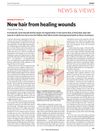TLDR Androgenic alopecia causes hair follicle degradation and skin restructuring, but some hair elements remain.
The study examines the structural organization of scalp skin under normal conditions and during androgenic alopecia. It finds that thicker hair, with deeper root bulbs, is more resistant to alopecia. Androgenic alopecia leads to the degradation of intradermal hair follicles, increased formation of aggregate follicles, and replacement of degenerating follicles with connective tissue. Despite complete hair loss, germinative epithelial elements remain, forming thin abortive hairs within sebaceous glands. The study concludes that androgenic alopecia results in compensatory skin restructuring, including increased blood vessel growth and higher sebaceous gland concentration, which may inform future dermatological treatments.
17 citations
,
November 2021 in “Journal of Cosmetic Dermatology” Combination therapies for androgenetic alopecia work best but can have significant side effects and costs.
 57 citations
,
May 2007 in “Nature”
57 citations
,
May 2007 in “Nature” Adult mice can grow new hair from skin wounds.
 10 citations
,
January 2007 in “Dermatology”
10 citations
,
January 2007 in “Dermatology” Sex-determining genes may affect male baldness.
 143 citations
,
October 1996 in “Dermatologic Clinics”
143 citations
,
October 1996 in “Dermatologic Clinics” Too much androgen can cause hair loss; finasteride may help.
 37 citations
,
September 1996 in “Journal of The American Academy of Dermatology”
37 citations
,
September 1996 in “Journal of The American Academy of Dermatology” Treat genetic hair loss early with FDA-approved medications and consider hair transplantation.
Current hair regeneration methods show promise but face challenges in maintaining cell effectiveness and creating the right environment for hair growth.
August 2025 in “Biomolecules” Fibroblast growth factors could be a better, safer treatment for hair loss than current options.
 179 citations
,
April 2012 in “Nature Communications”
179 citations
,
April 2012 in “Nature Communications” Regenerated fully functional hair follicles using stem cells, with potential for hair regrowth therapy.
July 2025 in “Bioactive Materials” New engineering methods show promise for regenerating hair follicles using stem cells and advanced technologies.
 88 citations
,
July 2019 in “International Journal of Molecular Sciences”
88 citations
,
July 2019 in “International Journal of Molecular Sciences” Using human fat tissue derived stem cells in micrografts can safely and effectively increase hair density in people with hair loss.






